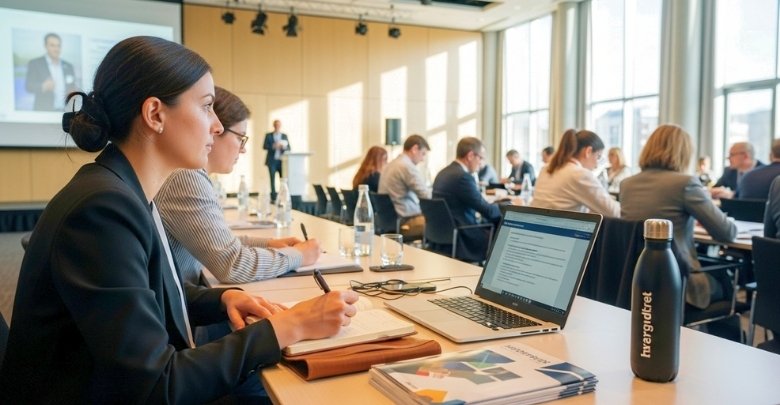Conferences are more than just meetings; they are places where people come together to share ideas, learn, and grow. Every successful event has one key part that makes it truly special—the delegates who take part in it. Their presence keeps the sessions active and full of fresh thoughts. But who is a Conference Delegate?
A conference delegate is a person who attends a conference to represent their company, institution, or themselves as an individual professional. They join to learn, share ideas, and build connections with others in the same field. Their presence helps create a space for learning, teamwork, and collaboration during the event.
Are you curious to know who can be a delegate and what they actually do? This article covers everything in detail, from types of delegates to the roles they play during a conference. So stay with us.
Who is a Conference Delegate?
A conference delegate is a person who attends a conference to represent their company, institution, or themselves as an individual professional. They join to learn, share ideas, and build connections with others in the same field. Their presence helps create a space for learning and collaboration during the event. Now, let’s understand who can be considered a delegate at a conference.

Business Professionals
Business delegates include company owners, managers, and executives who attend to learn new business ideas and expand their network. They often participate in conferences in USA, the UK, and Canada to explore global business trends and build international connections. Their presence adds value through knowledge exchange and practical business discussions.
Researchers and Academics
Researchers and educators attend conferences to present findings, share experiences, and learn about the latest trends in their field. They represent educational institutions or research centers that focus on innovation and discovery. Their contributions help improve knowledge and promote continuous learning across different industries.
Students and Young Professionals
Students and new professionals attend to gain exposure, learn from experts, and understand real-world practices. They are often future leaders who want to build skills and connections early. These delegates bring fresh ideas and enthusiasm that add new perspectives to conference discussions.
Government and Policy Representatives
Government officials and policy experts attend to understand public needs, support initiatives, and promote development programs. They connect with organizations, experts, and industries to improve national and regional policies. Their presence ensures public interests and goals are part of the discussions.
Nonprofit and Community Leaders
These delegates represent social organizations or community groups that work for public welfare and social change. They attend to share experiences, gain support, and promote community-focused projects. Their participation highlights the importance of collaboration between social and corporate sectors.
Roles and Responsibilities of a Delegate
Before, during, and after a conference, a delegate plays many important roles. They prepare well, stay active in sessions, and connect with other attendees. Every action helps make the event more useful and successful for everyone. Keep reading below to understand in detail what a delegate really does.
Preparing for Sessions
A delegate spends time learning about the event before it starts. They read the agenda, note key topics, and learn about the speakers. This helps them plan which sessions to attend and what questions to ask. Being well-prepared helps them join discussions confidently and make the most of every session.
Representing an Organization or Group
Delegates often attend on behalf of their company, school, or group. They carry their organization’s values and goals into the conference. Their job is to listen, share ideas, and speak when needed. Afterward, they take back important lessons to help their team grow and improve.
Networking With Others
One major task of a delegate is meeting people from different places. They exchange ideas, contact details, and experiences during breaks or events. This helps build new friendships and professional ties that can last long. Good networking also opens doors for future projects and learning opportunities.
Participating in Discussions
Delegates take part in group talks, Q&A rounds, and open sessions. They share opinions and listen to others’ views respectfully. Active participation makes discussions more useful and engaging. It also shows their confidence and willingness to learn and help solve real problems together.
Taking Notes and Sharing Knowledge
Delegates often take notes during sessions to remember key points. They may record insights, speaker quotes, or case studies. After the conference, they share this information with teammates. This helps others who could not attend learn from the event and apply the ideas.
Following Up After the Conference
After the event, delegates send messages or emails to people they met. They thank them for the connection and discuss future work or meetings. Keeping in touch builds stronger relationships. Following up also shows professionalism and a genuine interest in growing the connection.
Giving Feedback to Organizers
Delegates help organizers improve future events by sharing feedback. They comment on what went well and what could be better. Honest suggestions help make future conferences more organized and useful. Giving feedback also shows appreciation for the effort that went into the event.
Benefits of Being a Conference Delegate
Attending a conference as a delegate brings many personal and professional benefits. It helps you learn from experts, share your ideas, and build new connections. You also get a chance to represent your organization and improve your skills. Read below to discover the key benefits of being a conference delegate.
Learning From Experts
Delegates learn from skilled speakers who share real experiences and useful knowledge. Listening to these talks helps them understand new ideas and industry trends. They get to know how others handle similar challenges in their work. This learning helps them grow and perform better in their own roles.
Build Strong Connections
Conferences give delegates a chance to meet people from many backgrounds. They can talk, share ideas, and make long-term professional friends. These new connections often lead to helpful partnerships or learning opportunities. Networking in a friendly setting makes every conference more enjoyable and rewarding.
Improving Communication Skills
Speaking with new people helps delegates become better at expressing their thoughts. They learn to listen carefully, share ideas clearly, and ask smart questions. This builds confidence when talking to groups or professionals. Over time, these skills help in both work and everyday communication.
Gain Fresh Ideas
Conferences are full of new topics, creative thoughts, and fresh discussions. Delegates often return with ideas they can apply at work or in studies. These ideas come from experts, workshops, and talks with others. Being open to new thinking helps them stay active and ready to improve.
Representing Their Organization
When delegates attend a conference, they act as representatives of their group. They share what their team does and learn what others are doing. This helps spread awareness about their work and builds respect. Representing an organization also makes them feel proud and responsible.
Boosting Career Growth
Attending conferences often helps delegates grow in their careers. They gain new knowledge, make contacts, and learn from senior professionals. These experiences improve their understanding and open up more job opportunities. Being active in such events adds value to their professional profile.
Develop Leadership Qualities
Taking part in conference activities teaches delegates how to lead with confidence. They learn teamwork, decision-making, and problem-solving skills in real situations. Handling discussions or presenting views also builds leadership strength. These qualities make them more prepared for future roles and responsibilities.
Common Misconceptions About Delegates
Many people think they know what a conference delegate does, but that’s not always true. There are several wrong ideas that people often believe. These misunderstandings can make the delegate’s role seem confusing or less important. Let’s clear up some of these common misconceptions below.
Just Attending the Event
Some people think being a delegate only means sitting and listening. But delegates do much more than that. They join discussions, share ideas, and interact with other participants. Their active role helps make the event more lively and meaningful for everyone.
Only for Experts
Many believe only experts or top leaders can be delegates. This is not true at all. Anyone who wants to learn, share, or represent a group can be a delegate. Conferences welcome people with different backgrounds and skill levels.
No Real Responsibility
Some assume delegates just attend for fun and have no duties. In reality, they prepare, take notes, and share what they learn. They often represent organizations and must act professionally. Their role carries real responsibility before, during, and after the event.
Thinking Attendees and Delegates Are the Same
Many people mix up the terms “attendee” and “delegate.” They often fail to understand the difference between conference attendee and delegate, which leads to confusion. Attendees go to learn and listen, while delegates also represent groups or organizations. Both are part of the event, but delegates have more active roles.
All About Networking
While meeting people is part of the experience, it’s not everything. Delegates also learn from sessions, speakers, and group talks. Networking is helpful, but gaining new knowledge and sharing ideas are equally important. A good delegate balances learning with social connections.
Only For Big Companies
It’s a common belief that delegates must come from large companies. In truth, students, small business owners, and professionals also attend. Conferences are open to anyone with an interest in the topic. What matters most is participation, not the size of the organization.
Not Worth The Time
Some think attending as a delegate doesn’t add much value. But every event offers a chance to learn something new. Delegates gain knowledge, confidence, and connections that last long after the event ends. The time spent is always worth the experience gained.
Do Conference Delegates Face Challenges?
Yes, conference delegates do face challenges. Many find it hard to balance learning, networking, and representing their group at once. It takes time, effort, and focus to handle everything. These pressures can sometimes make the conference experience tiring and stressful for some delegates.
Some delegates also struggle to communicate well with others during discussions or workshops. They may feel nervous about sharing their views in public settings. This fear often limits their ability to express ideas clearly or make lasting professional connections.
After the event, following up with people or applying new lessons becomes another challenge. Many forget or delay sending messages or sharing notes. This missed step often reduces the value of what they learned during the conference.
Tips for Making the Most of Your Conference Experience as a Delegate
Attending a conference as a delegate is a great learning opportunity. You meet new people, hear new ideas, and gain fresh knowledge. Planning and staying active can make your experience even more rewarding. Read the simple tips below to get the most out of your conference.
Plan Your Schedule Early
One of the most useful tips for conference delegates is to plan early and stay organized. Before the conference begins, check the full agenda and highlight key sessions. Choose topics that match your goals and personal interests. A clear plan helps you manage time well and enjoy every part of the event.
Be Active In Q&A Sessions
Asking questions shows that you are interested and paying attention. It also helps you learn directly from the speakers. Don’t be afraid to raise your hand or share your thoughts politely. Being part of Q&A sessions builds your confidence and helps others notice your interest.
Connect With Speakers And Peers
Make the effort to talk with speakers and other delegates. A short chat or kind word can start a lasting friendship. Exchange contact details and follow up later with a thank-you note. Building such small connections can open big doors for learning and teamwork.
Take Notes During Sessions
Keep a notebook or digital file ready for each session. Write down key ideas, quotes, or facts that stand out to you. Taking notes helps you remember details later and share them with others. Well-organized notes can be a great resource after the conference.
Follow Up After The Event
Once the event ends, take time to reach out to people you met. Send a friendly message or email to stay connected. Share what you learned with your group or team members. Following up helps build stronger ties and keeps the conference benefits alive.
Stay Positive And Open-Minded
Conferences bring people with different ideas and backgrounds. Try to listen and learn even if you don’t agree right away. Staying positive helps you enjoy new discussions and see fresh viewpoints. An open mind makes the whole experience richer and more valuable.
Frequently Asked Questions
Being a conference delegate is a rewarding experience, but it often raises many questions. Whether you are attending for the first time or looking to understand the role better, these FAQs will give you clear and simple answers. Let’s explore the most common questions about being a conference delegate.
How Is a Delegate Selected?
Delegates are usually chosen by their organization, school, or through personal registration. Some events invite delegates, while others allow open sign-ups. The goal is to include people who can add value and take part actively. Anyone with an interest and purpose can become a delegate.
Can Anyone Become a Conference Delegate?
Yes, anyone with a genuine interest in learning and sharing ideas can be a delegate. There is no strict rule about age, background, or experience. Students, professionals, and researchers all attend conferences. What matters most is your willingness to participate and contribute.
Do Delegates Have to Pay to Attend?
Most conferences require delegates to pay a registration fee. This fee usually covers entry to sessions, workshops, and materials. Some organizations sponsor their delegates by paying the costs. It depends on the type of conference and the role of the delegate.
What Skills Help a Delegate Succeed?
Good communication, listening, and teamwork skills help delegates succeed. Being open-minded and prepared to learn from others is also important. Delegates who take notes, ask questions, and stay engaged get more value from the experience. Confidence grows with active participation.
What Should Delegates Bring to a Conference?
Delegates should bring notebooks, pens, business cards, and an open attitude. A digital device, like a tablet or laptop, helps with note-taking. Carrying a schedule or planner is also useful to track sessions. Staying prepared helps delegates stay organized throughout the event.
Do Delegates Need to Dress Formally?
Yes, dressing neatly or formally is usually recommended. Conferences often follow a business or smart-casual dress code. A good appearance shows respect for the event and other participants. It also helps make a positive impression while meeting new people.
How Long Do Conferences Usually Last?
Conferences can last from one day to several days, depending on the event size. Some are short workshops, while others include multiple sessions across different topics. Delegates should plan their schedule early to make the most of the time available.
Bottom Lines
Conferences are more than just events; they are places where learning and growth come together. Delegates make these moments meaningful through their active role in discussions, knowledge-sharing, and teamwork. They help bring people, ideas, and industries closer while shaping the success of every session they attend.
Recognizing who is a conference delegate helps you see how much value they add to every event. From professionals and students to policymakers and researchers, each delegate plays a part in spreading knowledge and building stronger connections. Their work keeps the conference atmosphere alive and purposeful from start to finish.
If you have ever thought of joining a conference, this is your sign to do it. Becoming a delegate lets you learn, share, and grow in ways that go beyond the event itself.







